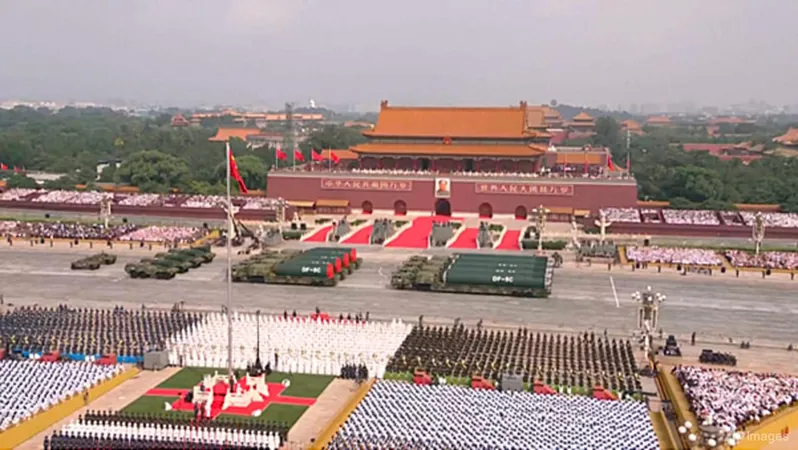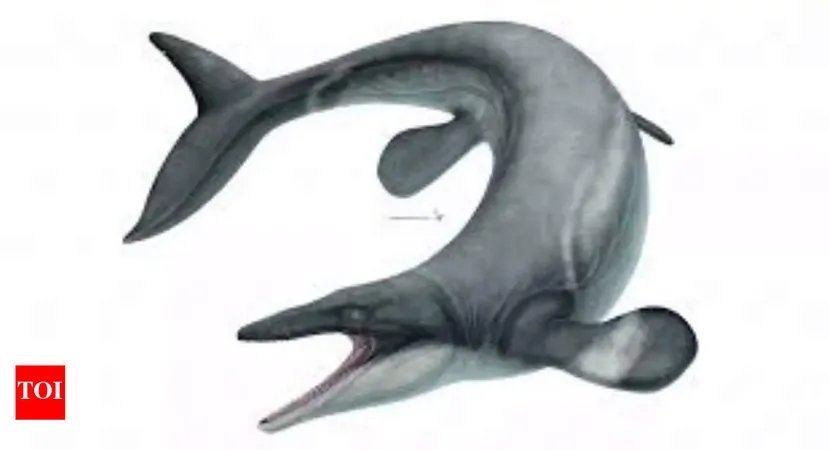
Is China Poised to Invade Taiwan by 2027?
2025-09-05
Author: Nur
A Display of Power Amid Rising Tensions
In a striking display of military might, China recently showcased hundreds of aircraft and advanced ground equipment during a grand parade celebrating the 80th anniversary of the end of World War II. The highlight was the unveiling of the DF-5C intercontinental strategic nuclear missile, which according to Chinese media threatens targets worldwide.
Experts note that China's military modernization is reaching unprecedented levels. David Sacks from the Council on Foreign Relations highlighted this rapid transformation, saying, 'China's military modernization is the fastest and most ambitious we've seen in peacetime.' He pointed to their advanced capabilities, including hypersonic missiles and modern fighter jets that rival those of the United States.
Taiwan's Vigilance and Concerns
As military tensions rise, Taiwanese public sentiment is evolving. Many now believe that a significant increase in defense spending is necessary, with polls showing that 51% of Taiwanese voters support a larger defense budget. This number represents the highest level of support recorded, reflecting growing fears regarding potential Chinese aggression.
Taiwanese President William Lai has been proactive, recently conducting large-scale civil defense drills to prepare for any eventuality. Meanwhile, the People's Liberation Army (PLA) has been conducting extensive military exercises aimed at simulating blockades and strikes on Taiwanese infrastructure.
Japan's Alarming Response
Japan is also on high alert. Recent defense reports label China as the 'greatest strategic challenge' to Japan's security. In 2022, Japan committed $290 billion to its military, marking its most aggressive rearmament campaign since World War II. Former Prime Minister Shinzo Abe underscored the importance of Taiwan's stability to Japan's own security.
The proximity of Taiwan raises significant concerns for Japan, especially after China conducted missile tests near Japanese territories in response to increased diplomatic engagement with Taiwan. Yet, Japan's lack of treaty obligations to defend Taiwan complicates its potential military interventions.
The Risk of Conflict
The specter of direct conflict looms, particularly with the U.S. military's involvement in defending Taiwan. Any military action in Taiwan might necessarily involve bases in Okinawa, which could make Japan a target in a Sino-American conflict.
Analysts believe that public opinion in Japan will heavily influence any military response. While some support enhanced military cooperation, many are against direct intervention unless provoked.
Seeking Peace Amidst Tensions
As both China and Japan ramp up their military capabilities, the world watches closely. China's expanding nuclear arsenal, reportedly the fastest-growing globally, has raised alarms, as experts assert it is pivotal for deterrence.
While some Chinese analysts argue that additional nuclear weapons are essential for deterrence against U.S. aggression, others advocate for a diplomatic approach toward Taiwan. The call for peaceful reunification remains a contentious topic, with warnings that reckless behavior from Taiwan's leadership could trigger a forceful response from Beijing.
Amid this complex landscape, Xi Jinping has posed a stark choice for the international community: a path of war or one of peace. The next few years will be critical in determining whether discussions and diplomacy can prevail over escalating military tensions.




 Brasil (PT)
Brasil (PT)
 Canada (EN)
Canada (EN)
 Chile (ES)
Chile (ES)
 Česko (CS)
Česko (CS)
 대한민국 (KO)
대한민국 (KO)
 España (ES)
España (ES)
 France (FR)
France (FR)
 Hong Kong (EN)
Hong Kong (EN)
 Italia (IT)
Italia (IT)
 日本 (JA)
日本 (JA)
 Magyarország (HU)
Magyarország (HU)
 Norge (NO)
Norge (NO)
 Polska (PL)
Polska (PL)
 Schweiz (DE)
Schweiz (DE)
 Singapore (EN)
Singapore (EN)
 Sverige (SV)
Sverige (SV)
 Suomi (FI)
Suomi (FI)
 Türkiye (TR)
Türkiye (TR)
 الإمارات العربية المتحدة (AR)
الإمارات العربية المتحدة (AR)